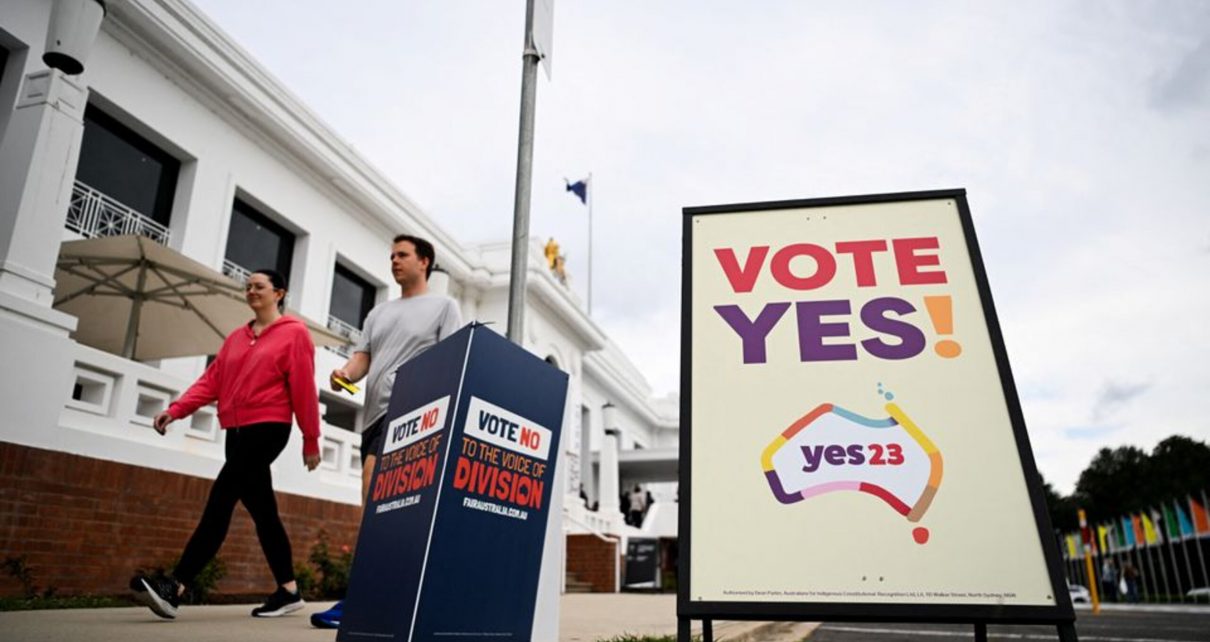In the wake of a resounding “No” vote in a landmark referendum that sought to recognise First Peoples in the Australian constitution, Indigenous leaders are advocating for a week of silence and contemplation.
The referendum, held on Saturday, aimed to amend the constitution to acknowledge Aboriginal and Torres Strait Islander people through the establishment of an Indigenous advisory body known as the “Voice to Parliament.” This body would have provided advice to the parliament on matters concerning the Indigenous community. However, over 60% of Australians voted against the proposal, and all six states rejected it.
“This is a bitter irony,” the Indigenous leaders expressed in a statement. “That people who have only been on this continent for 235 years would refuse to recognise those whose home this land has been for 60,000 and more years is beyond reason.”
In a symbolic gesture, they announced their intention to lower the Aboriginal and Torres Strait Island flag to half-mast for the week and encouraged others to do the same.
The outcome represents a significant setback for reconciliation efforts with Australia’s Indigenous community and raises concerns about the country’s international image in terms of its treatment of First Nations people.
Unlike some other nations with similar histories, such as Canada and New Zealand, Australia has not formally recognised or entered into a treaty with its First Peoples.
Aboriginal and Torres Strait Islander people constitute 3.8% of Australia’s population of 26 million and have inhabited the country for approximately 60,000 years. Yet, they are not mentioned in the constitution and remain among the country’s most socioeconomically disadvantaged groups.
“It’s very clear that reconciliation is dead,” commented Marcia Langton, one of the architects of the Voice, on NITV. “I think it will be at least two generations before Australians are capable of putting their colonial hatreds behind them and acknowledging that we exist.”
Reconciliation Australia, an Indigenous organisation, expressed the community’s struggle with the “ugly acts of racism and disinformation” that marred the debate surrounding the referendum.
Lloyd Walker, an Australian Indigenous leader and former national rugby union player, acknowledged the difficulty ahead in achieving reconciliation but emphasised the need to persevere. “We can say it got outvoted, but there were still 40% of the people who wanted it. Years and years ago, we wouldn’t have that percentage for sure,” Walker stated.
Prime Minister Anthony Albanese invested significant political capital in the Voice referendum, but his critics argue that it was his most significant misstep since assuming office in May the previous year.
Opposition leader Peter Dutton contended that the referendum was unnecessary and only served to divide the nation, with a lack of bipartisan support being one of the primary reasons for the loss. Leaders of major conservative parties campaigned for the “No” vote, and no referendum has passed in Australia without bipartisan backing.
Leaders urged Australians to reflect deeply on the role of racism and prejudice against Indigenous people in this result. “The only thing we ask is that each and every Australian who voted in this election reflect hard on this question,” they said in their statement.


